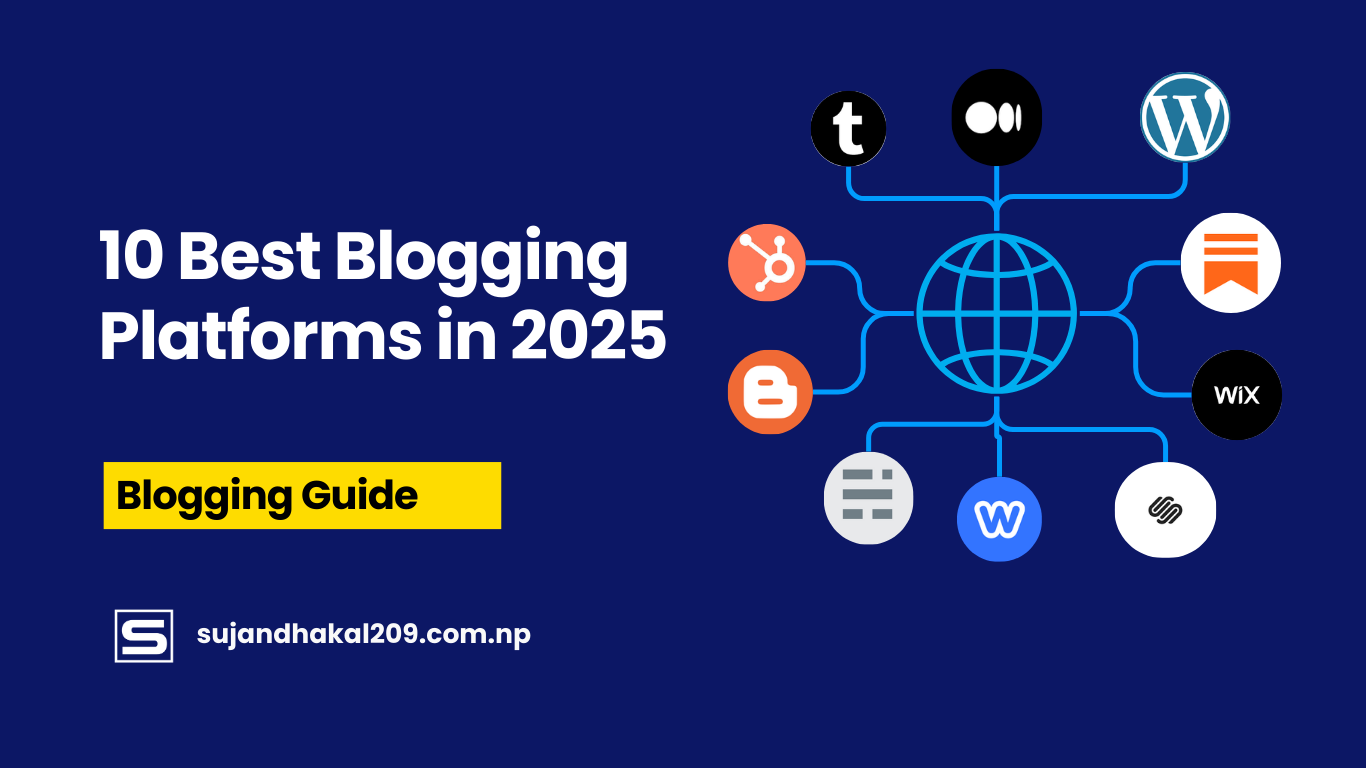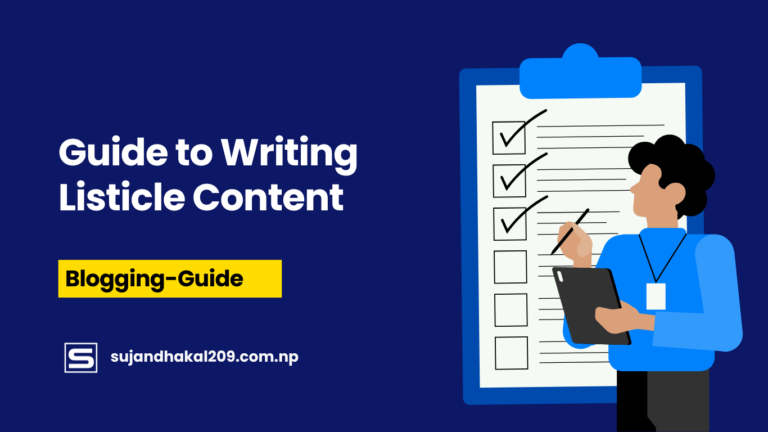Introduction
Starting a blog in 2025? Choosing the right blogging platform is the first and most crucial step. With so many options available, it can be overwhelming to decide which one suits your needs. Whether you’re looking for a free blog site, a powerful CMS, or a platform with built-in monetization, there’s a perfect choice for you.
In this guide, we’ll explore the 10 best blogging platforms in 2025, their features, pros, cons, and who they’re best suited for.
1. WordPress.org – The Most Powerful Blogging Platform
Features:
- Open-source platform with full customization
- Thousands of themes and plugins
- SEO-friendly with advanced tools
- Supports monetization through ads, affiliates, and e-commerce
- Large community support
Pros:
✅ Full control over design and functionality
✅ Best for SEO and advanced blogging
✅ Scalable – ideal for growing businesses
Cons:
❌ Requires hosting and domain purchase
❌ Learning curve for beginners
Best for: Professional bloggers, businesses, and those looking for complete control over their website.
2. Wix – Best for Beginners & Visual Creators
Features:
- Drag-and-drop website builder
- AI-powered design customization
- Built-in SEO tools and analytics
- App market for additional features
Pros:
✅ Extremely beginner-friendly
✅ No coding skills required
✅ Free and premium plans available
Cons:
❌ Limited scalability compared to WordPress
❌ Less control over SEO customization
Best for: Small businesses, portfolios, and beginners who want an easy-to-use blogging platform.
3. Squarespace – Best for Designers & Artists
Features:
- Professionally designed templates
- Built-in e-commerce features
- Mobile-responsive design
- No need for third-party hosting
Pros:
✅ Sleek, modern design templates
✅ Great for creative professionals
✅ Integrated marketing tools
Cons:
❌ Less flexibility than WordPress
❌ Slightly higher pricing than other platforms
Best for: Artists, designers, and photographers looking for an aesthetic blog with built-in design tools.
4. Blogger – Best Free Blogging Platform
Features:
- Free with a Blogspot subdomain
- Google AdSense integration
- Simple, user-friendly interface
- Secure and reliable
Pros:
✅ Completely free and easy to use
✅ Direct Google support
✅ Monetization options available
Cons:
❌ Limited customization compared to WordPress
❌ Less modern design options
Best for: Beginners and casual bloggers who want a free, simple blog.
5. Medium – Best for Writers & Thought Leaders
Features:
- Built-in audience with high engagement
- Minimalistic, distraction-free writing environment
- Monetization through Medium’s Partner Program
Pros:
✅ No setup required
✅ Great for gaining exposure
✅ High domain authority for better rankings
Cons:
❌ Limited branding options
❌ No direct control over SEO and monetization
Best for: Writers, journalists, and thought leaders who want to reach a broad audience without technical setup.
6. Ghost – Best for Publishing & News Blogs
Features:
- Lightweight, fast performance
- Built-in SEO tools
- Supports memberships and paid content
Pros:
✅ Speed and SEO advantages
✅ Ideal for independent publishers
✅ No distractions – pure writing focus
Cons:
❌ Requires self-hosting
❌ Less flexibility in design compared to WordPress
Best for: News sites, independent publishers, and serious bloggers who prioritize speed and SEO.
7. Substack – Best for Newsletter Blogging
Features:
- Email-based publishing
- Subscription monetization
- No technical skills required
Pros:
✅ Simple setup
✅ Direct audience connection
✅ No hosting fees
Cons:
❌ Limited design customization
❌ Content is email-based rather than website-based
Best for: Writers who want to monetize their content through newsletters.
8. Weebly – Best for Small Business Blogging
Features:
- Easy drag-and-drop editor
- Built-in e-commerce tools
- Free and premium plans
Pros:
✅ Simple and user-friendly
✅ Ideal for small businesses
✅ Affordable pricing
Cons:
❌ Limited features compared to competitors
❌ Not ideal for large-scale blogging
Best for: Small businesses looking for an easy blogging solution.
9. HubSpot CMS – Best for Marketing & Business Blogging
Features:
- Integrated with HubSpot’s CRM
- SEO and marketing automation tools
- Drag-and-drop editor
Pros:
✅ Best for inbound marketing
✅ Advanced analytics
✅ Great for businesses
Cons:
❌ Expensive compared to other platforms
Best for: Businesses looking for an all-in-one marketing and blogging solution.
10. Tumblr – Best for Microblogging & Social Blogging
Features:
- Social networking features
- Easy to share multimedia content
- Free and simple
Pros:
✅ Ideal for short-form content
✅ Built-in community engagement
✅ Free and easy to use
Cons:
❌ Not ideal for long-form content
❌ Limited SEO and monetization
Best for: Casual bloggers, meme creators, and social media enthusiasts.
Comparison Table of the Best Blogging Platforms
| Blogging Platform | Best For | Customization | Monetization | Ease of Use | Pricing |
|---|---|---|---|---|---|
| WordPress.org | Professional bloggers, businesses | ⭐⭐⭐⭐⭐ | ⭐⭐⭐⭐⭐ | ⭐⭐⭐ | Free (Hosting Required) |
| Wix | Beginners, small businesses | ⭐⭐⭐⭐ | ⭐⭐⭐ | ⭐⭐⭐⭐⭐ | Free & Paid Plans |
| Squarespace | Designers, portfolios | ⭐⭐⭐⭐ | ⭐⭐⭐ | ⭐⭐⭐ | Paid Plans |
| Blogger | Free blogging, beginners | ⭐⭐ | ⭐⭐⭐ | ⭐⭐⭐⭐ | Free |
| Medium | Writers, journalists | ⭐ | ⭐⭐ | ⭐⭐⭐⭐⭐ | Free |
| Ghost | Publishers, SEO bloggers | ⭐⭐⭐⭐ | ⭐⭐⭐⭐ | ⭐⭐⭐ | Paid (Self-Hosting) |
| Substack | Newsletter blogging | ⭐ | ⭐⭐⭐⭐ | ⭐⭐⭐⭐⭐ | Free (Revenue Share) |
| Weebly | Small businesses | ⭐⭐⭐ | ⭐⭐⭐ | ⭐⭐⭐⭐ | Free & Paid Plans |
| HubSpot CMS | Marketing, business blogging | ⭐⭐⭐⭐ | ⭐⭐⭐⭐ | ⭐⭐⭐ | Paid Plans |
| Tumblr | Microblogging, social blogging | ⭐ | ⭐ | ⭐⭐⭐⭐⭐ | Free |
How to Choose the Right Blogging Platform for Your Needs
With so many options, how do you pick the right blogging platform? Consider these factors:
1. Your Blogging Goals
- Are you starting a personal blog, a business website, or an online store?
- Do you need advanced SEO, e-commerce, or marketing tools?
2. Customization & Flexibility
- Do you want full control over design and functionality? (Choose WordPress.org)
- Do you prefer a simple drag-and-drop interface? (Try Wix or Squarespace)
3. Monetization Options
- Planning to earn from ads, affiliate marketing, or subscriptions?
- WordPress.org, Substack, and Ghost offer the best monetization opportunities.
4. Ease of Use & Learning Curve
- Are you tech-savvy or prefer a plug-and-play solution?
- Blogger, Wix, and Medium are the easiest platforms for beginners.
5. Budget & Costs
- Do you want a free platform or are you willing to invest in premium features?
- WordPress.org requires hosting but gives full control.
- Blogger, Medium, and Substack are free but offer limited customization.
By evaluating these factors, you can find the perfect blogging platform that aligns with your needs and goals.
Conclusion
The best blogging platform depends on your needs, technical skills, and monetization goals. WordPress.org remains the most powerful and flexible option, but platforms like Wix, Medium, and Substack are excellent alternatives for beginners and niche bloggers.
If you’re looking for a professional blogging experience, go with WordPress.org or Ghost. If you want an easy, hassle-free platform, Wix, Medium, or Blogger might be the best choice.
No matter what you choose, the key is to start writing, stay consistent, and grow your audience. Happy blogging in 2025!
FAQs
1. What is the best free blogging platform in 2025?
Blogger, Medium, and Tumblr are the best free blogging platforms. If you want a simple, beginner-friendly option, Blogger is ideal.
2. Which blogging platform is best for making money?
WordPress.org, Ghost, and Substack offer the best monetization options, allowing ad revenue, affiliate marketing, and subscription-based income.
3. Is WordPress still the best blogging platform?
Yes! WordPress.org remains the best blogging platform for those who want full customization, SEO benefits, and monetization control.
4. Which blogging platform is easiest to use?
Wix, Medium, and Blogger are the easiest blogging platforms, requiring no technical skills to get started.
5. What’s the best platform for professional blogging?
WordPress.org and Ghost are the top choices for professional bloggers looking for flexibility, SEO optimization, and full control.





